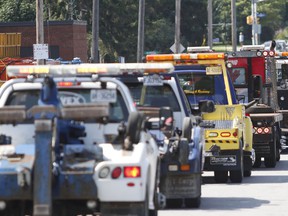Ottawa releases draft rules to regulate city's towing industry, including flat fees
The draft municipal licensing system would apply to an estimated 40 tow operators with 200 tow trucks and 225 tow drivers, plus operators of 20 vehicle storage facilities.

Article content
Ottawa tow truck operators will need to buy municipal licences and charge government-set rates if city council approves a proposed regulatory system this month.
Advertisement
Article content
The city has been toying with the idea of regulating the local towing industry for several years and finally took it on during this term of council even though the Ontario Progressive Conservative government pursued and passed a law governing the industry.
While waiting on regulations for the provincial law, the city has decided it needs to act now to regulate the towing industry locally and is asking council to endorse a municipal licensing program as a consumer-protection measure.
The draft municipal licensing system, released ahead of a community and protective services committee meeting scheduled for Sept. 16, would apply to an estimated 40 tow operators with 200 tow trucks and 225 tow drivers, plus operators of 20 vehicle storage facilities.
Advertisement
Article content
An operator of a tow service or vehicle storage site would pay $1,300 annually for a municipal licence and $550 for each tow truck in a tow operator’s fleet. Tow drivers would need to pay $450 annually.
On the city’s end, it would cost $307,000 to run the licensing system for the first year in 2022, with the cost dipping to $283,000 in 2023 after the initial start-up expenses, such as an inventory of plates and stickers. The money would pay to add the equivalent of 2.5 full-time positions to the municipal public service for program oversight. Licence fees are projected to make it a break-even program for municipal taxpayers.
Advertisement
Article content
To get a towing licence from city hall, operators would need to provide proof of a good driving record, a police background check and proof of insurance. Fee rates for several tow services would be set by the city.
The city’s proposed flat fees include $300 for a standard tow of a vehicle involved in a collision and $175 for a vehicle not involved in a collision. There would be an additional distance fee for towing beyond 20 kilometres.
The proposed bylaw provides exceptions for tow operators that exclusively provide services for charitable or non-profit organizations, haul vehicles to scrap yards or provide services to school boards.
Steve Redpath, owner of Redpath Towing, said the draft regulations would cost him money in municipal licensing fees, but he sees a need for city hall to come up with some rules to clamp down on the “bad apples” in the tow industry.
Advertisement
Article content
Redpath said a municipal licensing system wouldn’t seriously impact his business since he doesn’t do much collision towing, a subset of the industry that he believes is being targeted by the new regulations.
“It’s going to cost me a few thousand dollars to keep on playing, but it’s not going to affect my day-to-day operations and what I do,” Redpath said. “I think I’ll just have to carry some more paperwork.”
Redpath said the proposed municipal licensing system was a result of weak enforcement of existing rules governing the tow industry, on top of the Ottawa Police Service’s creation of collision reporting centres.
The city has a bylaw banning tow operators from being within 100 metres of a collision unless they were called to the scene.
Advertisement
Article content
For motorists involved in minor fender-benders, Ottawa police ask that they report to the collision reporting centres on their own rather than the police force sending officers to the scene. Redpath says it has meant tow operators have been circling those accident scenes for business and charging big fees to tow vehicles.
The Canadian Automobile Association (CAA) welcomes a local regulatory system for the tow industry. The organization is part of the province’s towing advisory group.
CAA North and East Ontario said it participated in discussions with the city during development of the draft towing regulations. In a written statement provided by director of communications Julie Beun, the local CAA organization said many of the city’s regulatory proposals would also be covered by provincial legislation when Ontario regulations come into force, but the municipal measures will help in the interim.
“Overall, Ottawa’s efforts are a step in the right direction to protect road users from unscrupulous operators and to support legitimate operators with a legislative framework,” the organization said.
The city wants the municipal licensing system for the tow industry to start Jan. 1. Staff would revisit the municipal system when the provincial regulations come into force to see if changes to the bylaw would be required.
According to the city, 19 municipalities in Ontario have business licensing systems for the tow industry, mainly in the Toronto area.


